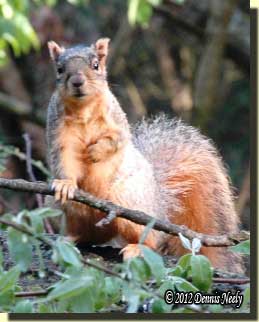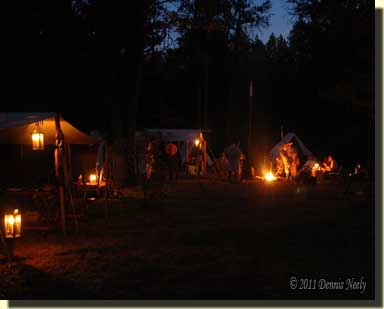Delicate ice skimmed the waterhole’s edge. A heavy hoar frost clung in the low ground. Faint stars still sparkled overhead. Chilled breaths hung like miniature clouds drifting in night’s last hurrah. Buffalo-hide moccasins whispered along the earthen trail, then ascended a rolling hill.
On the ridge crest a silver, dewy bead tipped each blade of grass. Looking down, the white frosty flakes that coated the hunt-stained buckskin leggins had melted.
When the path forked, the east leg offered the most promise. Cedar boughs clawed at the sleeves of the linen hunting shirt. An unseen twig caught between the frizzen cam and the browned spring, tugged the Northwest gun to the right, then pulled free with a noticeable “pop.” I stopped and stood up straight in a sequestered space between two large red cedar trees.
The English flint snapped to half-cock. I fiddled with the frizzen, making sure it operated as it should. A gentle smile crossed my face, for there was no need for the fuss. The bore held nary a death bee. The pan was devoid of gunpowder. Satisfied, I pushed the frizzen up, eased the hammer down and went on my way.
“Gob-obl-obl-obl! Obl-obl-obl-obl!”
The morning’s first tom called from far off, to the southeast, either atop Fox Hill or from the tall oaks to the north. A second wild turkey answered, farther north, but just as distant. I heard no hens as my moccasins pressed on, venturing deeper into the cedar grove. Despite the stand’s dark shadows, first light caused a noticeable stirring. Cardinals sang, crows cawed and geese ke-honked as they winged toward the River Raisin’s mud flats.
“Gob-obl-obl-obl!”
With little hesitation the other tom responded, “Gob-obl-obl-obl! Obl-obl-obl-obl! Obl-obl-obl-obl!”
Leggins swished as the moccasins circled a favorite haunt, an old cedar tree with broad boughs, encrusted with tangled grape vines. After entering the “vine tree’s” natural shelter, I tossed the blanket roll to the right, then sat cross-legged upon it. As the morning light grew brighter, what little gobbling and clucking the birds offered that second Friday of April, in the Year of our Lord, 1792, diminished to silence.
 In due time, light beams caressed the upper branches of the oaks on the far hillside. The rising sun’s line edged lower and lower on the hardwoods. Then a plump fox squirrel bounded down the knoll to the north. It dug a bit, scattering dirt and grass, perhaps fifteen paces distant. From its actions, I thought it might come join me in the shadows, but it did not.
In due time, light beams caressed the upper branches of the oaks on the far hillside. The rising sun’s line edged lower and lower on the hardwoods. Then a plump fox squirrel bounded down the knoll to the north. It dug a bit, scattering dirt and grass, perhaps fifteen paces distant. From its actions, I thought it might come join me in the shadows, but it did not.
A few minutes later, another fox squirrel emerged from the cedar trees to my left. It sniffed around, then sat upright and chattered. The first squirrel approached, and as one might expect, a robust frolic ensued. At one point, the pair ran under the grape vines that touched the ground behind me, on the other side of the trunk. I turned to my right to watch.
When I turned back, greyish-brown fur caught my eye, not that far from where the first bushytail dug. After two lazy hops, I saw the cottontail rabbit full on. It bent forward and nipped a wide leaf of grass, then clutched it in its front paws as it nibbled away. With no wild turkeys to entertain this humble woodsman, rabbits seemed second best.
Think Before You Post!
That morning’s delightful sojourn was a pre-season turkey scout. In my journal I scribbled that “I started a bit late,” and I judge that not by a timepiece, but by when the birds begin tree talk. Some mornings they remain silent and all that a woodland spectator can hope for is the sound of big wings thrashing as the birds fly down. Then sometimes at first light every bronze beauty has to be heard. That morning fell in between, and the memory that stuck in my mind was of the two squirrels and the rabbit’s soft little nose twitching up and down as it devoured that blade of grass.
The other day, a fellow traditional black powder hunter sent me a copy of a rather lengthy thread from the posting of a social-media question regarding taking squirrels and rabbits out of season while on a trek or engaged in a living history scenario. As I read the litany of disturbing posts, the memory of that particular morning played over and over in my mind.
It took me a while to sort out the comments, because some of the more boisterous proponents expressed their opinions multiple times. As one might expect, the responses covered all aspects of the original question from snarky innuendos to matter-of-fact refusal to break modern game laws.
Those who thought it was “acceptable” to take game out of season, less than a dozen individuals, outnumbered those who wouldn’t under any circumstances. Some of the posts didn’t express an answer, one way or the other, but their silence on the issue did nothing to condemn the practice. Regardless of the numbers, the impression their claims leave is that this is a common practice among traditional woodsmen, which it is not. Judging all traditional black powder hunters by the postings of a dozen people is neither fair nor representative.
I don’t know what there is about pounding keys and hiding behind a flat-screen monitor that pumps up peoples’ bravado to the point they want to spew out tales from the dark side, but that seems to be the nature of today’s social media frenzy. In my opinion, first, the question never should have been raised for discussion, and second, there is no room for this lawless attitude in living history or traditional black powder hunting.
The notion of “measured compromise” is a recurring theme woven throughout my traditional black powder hunting writings. Regardless of our chosen era, as living historians we all must engage in traveling back in time within the framework of 21st-century life. As much as we would like, we cannot physically return to the past.
Modern intrusions, be they game laws, jets flying overhead or a garbage truck’s squealing back-up alarm in the distant village, are a fact of each history-based simulation, to say nothing of those circumstances, both environmental and manmade, that pose an immediate threat to a time traveler’s safety.
A traditional hunter is left with two choices, let the intrusion destroy a living history scenario, or learn to evaluate the situation, measure the need for a response, and apply an appropriate compromise that minimizes a transgression’s adverse impact.
Although not calling it “measured compromise,” some respondents alluded to the concept when they spoke of taking sufficient food along to meet the needs of a given 18th-century woodland experience, be it a trek, scout, re-enactment or traditional hunt. And as one individual noted, “Being hungry is period correct…”
By embracing the principle of measured compromise, the choice of abiding by the game laws, as an example, never casts a shadow over an historical simulation, because the choice to conform is made prior to venturing back to yesteryear.
“Choice” is a key word here, because regardless of the specifics of re-creating a hunt from long ago there are always options along the path. As a re-enactor, I make a conscious, and serious, choice when I unleash the death sphere.
From the comments to the social media question, to a person, everyone knew they were violating modern game laws. In essence, each individual made a conscious choice to vacate the historical significance of the moment. To me, this shows a total lack of commitment to living history, to say nothing of being disrespectful to one’s fellow time travelers.
Instead of welcoming the squirrel or rabbit as a bit player in an historical simulation, these poachers willfully return to the 21st century and transform the creatures of the forest into modern intrusions as they ever so briefly weigh the legality of shooting. In a moment of weakness, they allow an intrusion in and destroy what might be a pristine living history memory—and then they gloat about their actions.
 Over the years I have participated in a number of traditional black powder hunting camps. Authenticity and a true-to-life immersion in a meaningful impression are top priorities. The timing of these outings always centers on the open seasons for the game species the participants are most likely to encounter. At every camp, at least one person brings additional food, unless the premise of the camp is to “live off what you kill.”
Over the years I have participated in a number of traditional black powder hunting camps. Authenticity and a true-to-life immersion in a meaningful impression are top priorities. The timing of these outings always centers on the open seasons for the game species the participants are most likely to encounter. At every camp, at least one person brings additional food, unless the premise of the camp is to “live off what you kill.”
And out of season, an integral part of any historical trek or scout usually includes provision for food, again, unless traveling hungry is a key element of the scenario. I have not been a part of, and will not be a part of, any activity that endorses “busting squirrels and rabbits for dinner…outta season.”
And what about the young people we are trying to recruit or introduce to living history and traditional black powder hunting? What a wonderful example this sets for them, to say nothing of the great light this shines on the hobby.
What of the lesson that it teaches? If one can pick and choose which game laws to abide by, then what about the other laws that bind a civil society together? If you want a new duck call, why not just walk out of the store with it? If you need to go to the state game area, why not just take your neighbor’s new pickup? Enough said.
Think before you post, be safe and may God bless you.



5 Responses to Rabbits Seemed Second Best